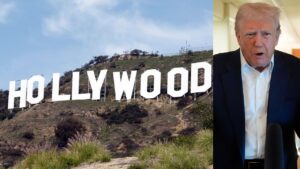President Trump has announced a sweeping 100% tariff on movies produced outside the U.S., aiming to bolster the struggling American film industry while addressing concerns of cultural influence and national security. As the initiative begins to take shape, industry responses highlight a mix of skepticism and support.
Trump Proposes 100% Tariff on Foreign Films to Revitalize American Cinema

Trump Proposes 100% Tariff on Foreign Films to Revitalize American Cinema
In a bid to ensure the survival of the U.S. film industry, President Trump announces a significant tariff on foreign-produced movies, citing national security and job preservation.
In an assertive move to revitalize the American film industry, President Donald Trump unveiled a plan on Sunday to impose a 100% tariff on all films produced outside the United States. This bold initiative is designed to counteract the declining domestic film production and combat what the President terms a national security danger posed by foreign incentives that entice U.S. filmmakers to relocate.
Underlining the urgency of the situation, President Trump remarked that the American movie sector is facing a rapid decline, attributing this crisis to attractive incentives offered by other countries. He stated emphatically, “The Movie Industry in America is DYING a very fast death,” indicating the precarious position of homegrown cinema. The intention behind the tariff is to boost film production within the United States, thereby safeguarding American jobs and cultural heritage.
The President also framed this strategy as a crucial measure for national security, suggesting that films produced overseas may carry foreign propaganda. He pointed out that efforts by other nations to lure U.S. creatives abroad not only threaten the domestic film industry but may also jeopardize the nation's cultural messaging.
The directive places the responsibility of launching the tariff process on the Department of Commerce and the U.S. Trade Representative. Although details regarding implementation remain vague, the announcement has already ignited discussions among industry stakeholders. Commerce Secretary Howard Lutnick reinforced the administration's intentions, stating, “We’re on it.”
While some industry leaders and international partners have voiced concerns about the ramifications of this tariff, proponents argue that such a decisive action is vital for level playing fields and the revitalization of the American film sector.
This tariff initiative aligns seamlessly with President Trump’s larger economic agenda that focuses on bolstering American industries and diminishing reliance on foreign production. By adopting a firm stance, the administration aspires to rejuvenate Hollywood's stature and reaffirm the United States' dominance as a cinematic force globally.
As the policy progresses, its effectiveness in reviving the domestic film landscape will garner extensive scrutiny. Regardless, the administration's resolve to protect American cultural and economic interests is unmistakably clear.




















